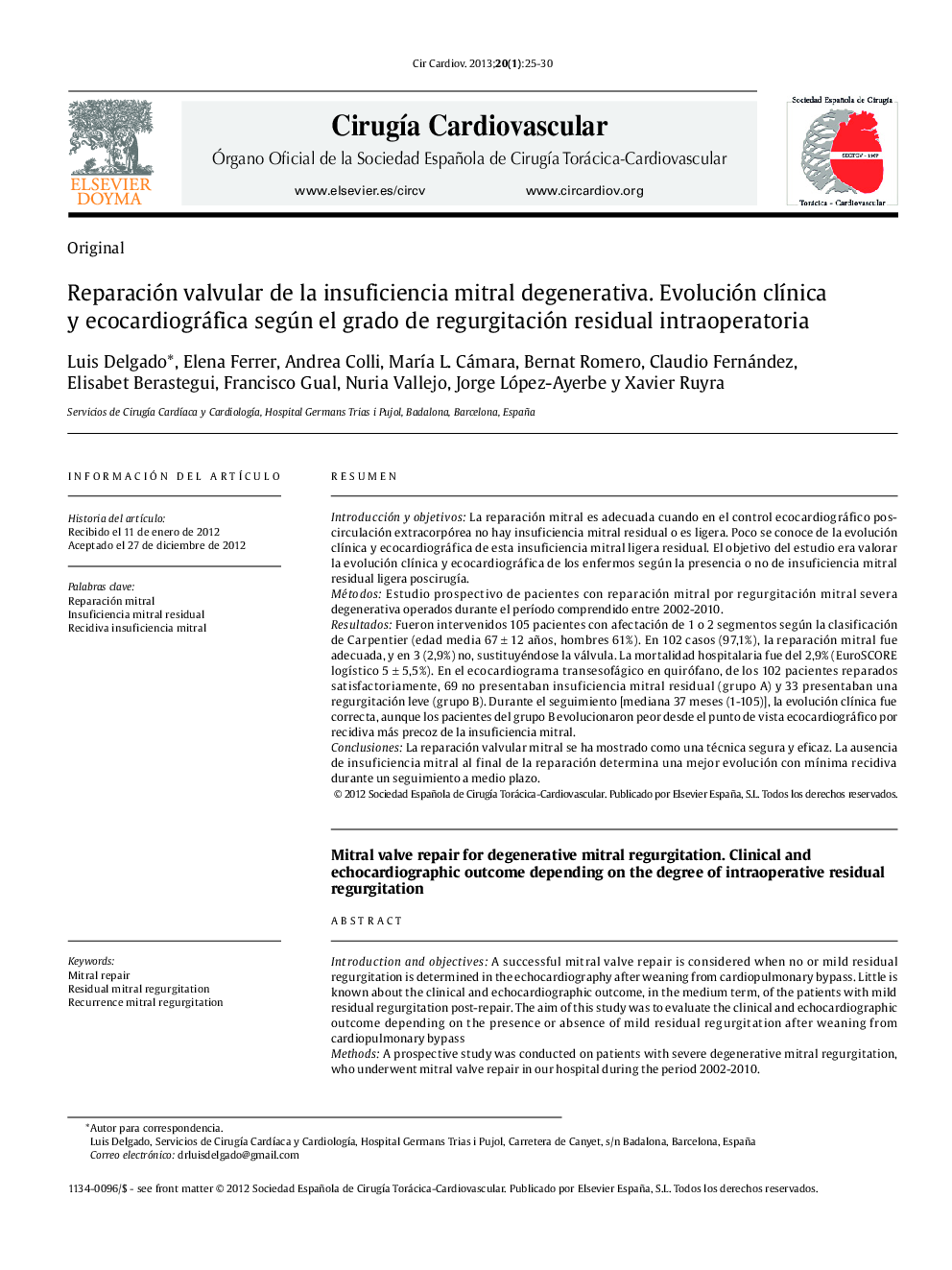| Article ID | Journal | Published Year | Pages | File Type |
|---|---|---|---|---|
| 2907625 | Cirugía Cardiovascular | 2013 | 6 Pages |
ResumenIntroducción y objetivosLa reparación mitral es adecuada cuando en el control ecocardiográfico poscirculación extracorpórea no hay insuficiencia mitral residual o es ligera. Poco se conoce de la evolución clínica y ecocardiográfica de esta insuficiencia mitral ligera residual. El objetivo del estudio era valorar la evolución clínica y ecocardiográfica de los enfermos según la presencia o no de insuficiencia mitral residual ligera poscirugía.MétodosEstudio prospectivo de pacientes con reparación mitral por regurgitación mitral severa degenerativa operados durante el período comprendido entre 2002–2010.ResultadosFueron intervenidos 105 pacientes con afectación de 1 o 2 segmentos según la clasificación de Carpentier (edad media 67 ± 12 años, hombres 61%). En 102 casos (97,1%), la reparación mitral fue adecuada, y en 3 (2,9%) no, sustituyéndose la válvula. La mortalidad hospitalaria fue del 2,9% (EuroSCORE logístico 5 ± 5,5%). En el ecocardiograma transesofágico en quirófano, de los 102 pacientes reparados satisfactoriamente, 69 no presentaban insuficiencia mitral residual (grupo A) y 33 presentaban una regurgitación leve (grupo B). Durante el seguimiento [mediana 37 meses (1–105)], la evolución clínica fue correcta, aunque los pacientes del grupo B evolucionaron peor desde el punto de vista ecocardiográfico por recidiva más precoz de la insuficiencia mitral.ConclusionesLa reparación valvular mitral se ha mostrado como una técnica segura y eficaz. La ausencia de insuficiencia mitral al final de la reparación determina una mejor evolución con mínima recidiva durante un seguimiento a medio plazo.
Introduction and objectivesA successful mitral valve repair is considered when no or mild residual regurgitation is determined in the echocardiography after weaning from cardiopulmonary bypass. Little is known about the clinical and echocardiographic outcome, in the medium term, of the patients with mild residual regurgitation post-repair. The aim of this study was to evaluate the clinical and echocardiographic outcome depending on the presence or absence of mild residual regurgitation after weaning from cardiopulmonary bypassMethodsA prospective study was conducted on patients with severe degenerative mitral regurgitation, who underwent mitral valve repair in our hospital during the period 2002–2010.ResultsMitral valve repair was performed on 105 patients (66%males, mean age 67±12 years-old) with prolapse of 1 or 2 scallops/segments according to the Carpentier classification. In three patients the repair was not adequate and the valve was replaced. The successful repair rate was 97.1%. After weaning from cardiopulmonary bypass, 69 patients had no residual regurgitation (group A), and in 33 it was mild (group B). The postoperative mortality was 2.9% (logistic EuroSCORE 5±5.5%). During a median follow-up period of 37 months (1–105) both groups had improved their clinical condition, but group B patients suffered an earlier II or III mitral regurgitation recurrence.ConclusionsMitral valve repair proved to be a safe and effective technique. Absence of mitral regurgitation post-repair determines a better outcome with minimal recurrence in the medium term.
